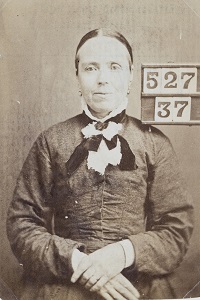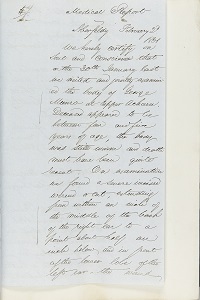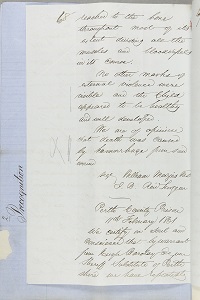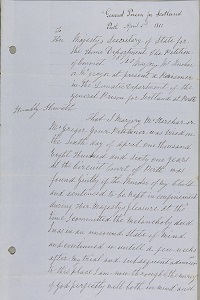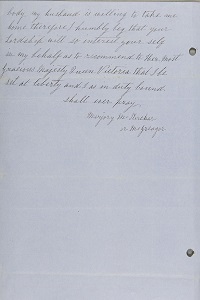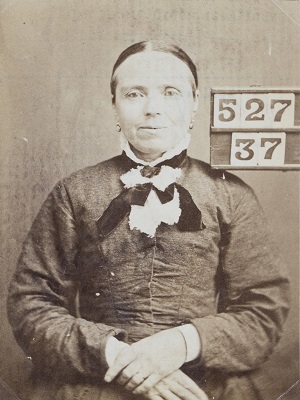
Marjory McKeraker or McGregor
Admitted 1861. Murder
Marjory McKeraker or McGregor murdered George Munro, her illegitimate son, aged four. Child murders made up half the female admissions to Perth’s Criminal Lunatic Department (CLD), these mostly of older, rather than new-born infants.
There were two strands to how contemporaries understood Marjory’s horrific act. The first was ‘derangement of religious thoughts’, Marjory being an avid attender of the radical Free Church of Scotland that flourished in her native Highland Perthshire. Victorians believed misdirected religious devotion could manifest and cause derangement, especially among women, whose minds they thought weaker than men’s.
‘Afraid of the devil…her mind tossed between hope and despair, sleepless, attempted to throw herself out of the window, thought herself lost, dying, burning secretly and suddenly got hold of a razor and cut her child’s throat and then attempted her own. The opinion of the witnesses was that revival excitement had brought on this paroxysm of insanity. A few Sundays before she spoke out in prayer in church and the clergyman thought her mind was wrong (afflicted), very ignorant of the Scriptures, mind considered by several witnesses not strong; got drunk at times. When calm she looked sane, but now and then became suddenly mad on her way to Perth and outrageous.’
Both legal and medical authorities looked closely at personal morality because they thought insanity was the result of failures in character.
‘She is reported to have been a very loose character, at one time on the poor roll. She has had two illegitimate children and has lived with other men, previous to her marriage with her present husband, who is said to be a weak fellow.’
Petite at 4 feet 10 inches tall (1.5m), with a fresh complexion, black hair, and grey eyes, when first imprisoned, Marjory spoke of ‘the wickedness of her past life’. She said, the devil came to her and told her that reading the Bible would stop her getting to ‘the good place’. Asked about the murder, she said she ‘believed that she and her boy were “in the bad place” and that to get out of it, her duty was to cut her own and the child’s throat’. But a few days later she spoke of ‘the love she bore him and with sorrow and remorse at the deed she had done, recalling with convulsive weeping the parting smile of her child as she was to seize the murderous weapon’.
Marjory’s homicidal attack was a one-off and she made good progress in her early years at Perth, first conditionally released in 1875. The problem was prisoners under conditional release required a guardian. Private individuals responsible for their supervision, Guardians were legally answerable to the Scottish Office. The records note that ‘her friends [relatives, including two married sisters living in Perthshire] are not at all likely to come forward’ and the compassionate householders who did take her in sooner or later thought better of the arrangement.
By the 1880s resident and visiting medical men were unanimous that ‘hers is really a deserving case’ for discharge. Between 1877 and her unconditional discharge in 1907, at the age of 74, Marjory went through several guardians and two readmissions.
We last read of her living with a married niece in Dundee, working as a cleaner.
Photograph of Marjory taken from the Criminal Lunatic Department Case Book
Credit: Crown copyright, NRS, HH21/48/1 page 93
Post mortem report into the death of George Munro by William Menzies M.D. and J.B. Reid, Surgeon, 2nd February 1861, p1
Credit: Crown copyright, NRS, AD14/61/7
Post mortem report into the death of George Munro by William Menzies M.D. and J.B. Reid, Surgeon, 2nd February 1861, p2
Credit: Crown copyright, NRS, AD14/61/7
Letter written by Marjory to the Secretary of State for the Home Department stating that she is ‘through the mercy of God both perfectly well in both mind and body’ and requests her freedom from prison, 3rd April 1863, p1
Credit: Crown copyright, NRS, HH18/51
Letter written by Marjory to the Secretary of State for the Home Department stating that she is ‘through the mercy of God both perfectly well in both mind and body’ and requests her freedom from prison, 3rd April 1863, p2
Credit: Crown copyright, NRS, HH18/51
Extract from Dundee Advertiser, 6th August 1895. It describes how, after being released and finding work, her employer died and unemployed again Marjory returned to prison. She seeks employment as has ‘no friends in the world to help her’
Credit: Crown copyright, NRS, HH17/107

